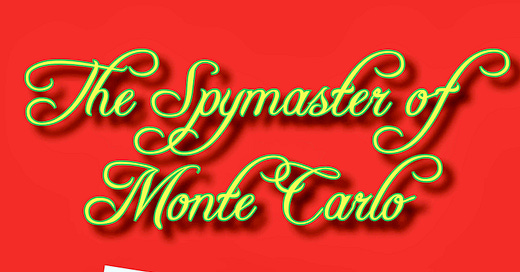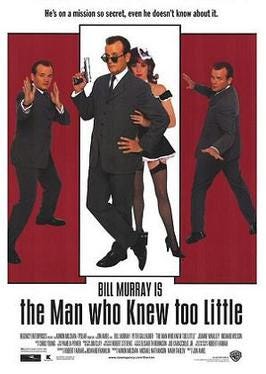THE SPYMASTER OF MONTE CARLO: 7) LIAISON-PLUS
A Throwback Thursday Memoir of Intrigue & Lunacy
June 2003, London
Once CIA signed on, MI6—which considers itself CIA’s gatekeeper to Europe—strengthened its own ties with our fledgling service, not least because its officers identified another issue (beside oil embargo-busting) that overlapped with Monaco: A retail tycoon whose wife had established residency in Monaco to shield the family money from UK taxes.
MI6 suspected this individual, along with six other Monaco-based Brits, of insider trading and manipulating the UK stock market.
Thus, MI6 requested that we assist them, and I agreed to broach this with the prince for authorization, as their target was Albert’s occasional tennis partner.
The prince, without hesitation, authorized me to add this individual to my target list and commence an investigation, for two reasons: 1) to assist MI6 and 2) to determine if the prince should keep this individual at arm’s length.
The next step was for the prince and me to meet in London with CIA and MI6 (separately) during the prince’s private visit to the British capital on June 17th and 18th—one full year since the Albert commissioned me to create his own intelligence service.
In a memo to the Prince, I wrote:
The purpose of these meetings is to develop a high level of trust and cooperation between the US/UK and the prince personally. In practical terms, this means that we may call upon the tremendous resources of CIA/SIS to assist us with our ongoing enquiries. Conversely, CIA/SIS may call upon us to discreetly assist with their own operational concerns in Monaco, an overlapping of mutual interests. Best of all, these meetings convey the prince’s good faith for wishing to keep Monaco clean of money laundering and organized crime activity.
Prince Albert landed at Luton Airport late in the afternoon and when he arrived at the London Hilton Hotel, we jumped into action.
First, a short drive up Park Lane to the Marriott Park Hotel where two very large men from CIA awaited us in their Marble Arch Suite.
One of the two was European Division Chief Tyler Drumheller, who we had met for dinner four months earlier in Washington, D.C.
The other: Paris Station Chief Bill Murray (not the actor, too bad, it would have made for a much higher L.Q.).
CIA had decided that all contact with our service would be channeled through Paris.
CIA’s initial playbook was straightforward, if doomed to failure: Cut out the middleman (me) and deal directly with the prince.
This was not unexpected but in fact standard operating procedure, as our "chairman emeritus" Clair George had forecast and then cautioned: If you’re the middleman, watch for the cut.
We were ready. And watching.
The prince and I had our own plan: I would coordinate all intelligence/contact with CIA and, in fact, would manage and monitor all contact with any intelligence service with which we created a relationship.
I could thereby ensure that no service took advantage of their liaison partnership with us.
As stated in my memo to the Prince:
It is my role to manage these relationships; not only for maximum effectiveness, but also to ensure the prince’s best interests are served. As such, I become a liaison between parties—understood by all—with loyalty to my client, the prince.
The dynamic duo from CIA, I soon learned, wrote it up their own (self-indulgent) way.
They fancifully mischaracterized our meetings in Washington and London as their recruitment of Prince Albert.
"The crowning moment of my career," Tyler Drumheller was heard to crow around the corridors of Langley.
(I know this because, by then, I had sterling sources everywhere.)
To my mind, and Albert's, our relationship with CIA was purely liaison-plus, which is to say, a special liaison partnership with no strings attached.
Certainly, this was not a recruitment of the prince.
We would soon ensure that Congressional Intelligence Oversight (including House Committee Chairman and soon-to-be CIA Director Porter Goss) fully understood the true nature of the Prince Albert/Monaco-CIA relationship.
Bill Murray, CIA’s Paris Station Chief, told me he had notified the French internal security service (then called DST) of their contact with the prince; the French, he added, had no objection to this arrangement. (France is pledged, by treaty, to defend Monaco and they use it—some might say abuse it—as an "offshore" haven for their own purposes).
(I had not asked the French intelligence services for permission to be Prince Albert's spymaster, though I would eventually seek their assistance—and receive it.)
In fact, Murray added, the French had been unusually cooperative of late, arresting terrorists and confiscating their money.
The focus of our relationship with CIA (its European division chief and Paris chief of station determined) would be counter-terrorism, which was the only game being played by Western intelligence services in the years following 9/11—to the detriment of all other national security concerns.






You are a great story teller Robert, whith an awesome imagination,,,,do you never sleep? when do you find time to fulfill alle these stories !! Thank you for them !!
your old friend AJ in the real Washington